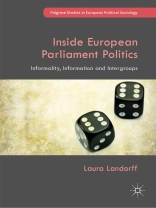The study of the informal dimension of EU politics is more important than ever in order to understand how the EU system works. This book presents an innovative and original study on informal cross-party, cross-committee groupings in the European Parliament, so-called Intergroups. Building on extensive fieldwork, including semi-structured interviews and observations, this study shows how parliamentarians of the seventh European Parliament (2009-2014) gain a variety of social resources, such as social, informational and political capital, in Intergroups, which they subsequently mobilise to foster opinion-formation across political groups and parliamentary committees, and to shape the EP’s agenda and policy outcomes. Drawing on an interdisciplinary, Bourdieusian-inspired framework, this book makes a valuable contribution to sociological approaches in European integration studies. Shedding new light on the informal dimension of parliamentary practices and politics, this book appeals to EPas well as EU scholars, to students and practitioners of EU politics, and civil society.
قائمة المحتويات
1 Introduction.- 2 Opening up institutional black boxes: The European Parliament from a Sociological Perspective.- 3 Intergroups in the European Parliament: Institutionalisation and Regulation.- 4 Who are the MEPs Making up Intergroups? A Socio-Political Analysis.- 5 Finding Allies: The Intergroup as Bridging Social Capital.- 6 Seeking Information: The Intergroup as Informational Capital.- 7 Conversion and Mobilisation of Political Capital.- 8 Conclusion.
عن المؤلف
Laura Landorff is Assistant Professor in European Studies at the Department of Culture and Global Studies at the University of Aalborg, Denmark. Her research focuses on the European Parliament, informal politics, political sociology and European integration.












